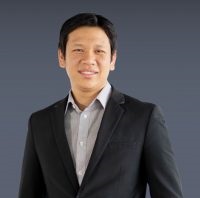


University of Linkoping, Sweden

King Mongkut's University of Technology Thonburi, Thailand
Vidyasirimedhi Institute of Science and Technology, Thailand

In the context of collaborative robotics, both distributed planning and task allocation, and acquisition of situation awareness are essential for supporting goal achievement, collective intelligence, and decision support in teams of robots and human agents. This is particularly important in applications pertaining to emergency rescue and crisis management. Given a high-level mission specification provided by a member of a rescue team, human or robotic, one then requires a mechanism for generating and executing complex, multi-agent distributed plans and tasks. The proper task representation is essential for both the generation and execution of complex multi-agent distributed tasks. Task Specification Trees have been proposed for this purpose and a Delegation Framework is used for distributed task allocation. Additionally, during operational missions, data and knowledge is gathered incrementally and in different ways by teams of heterogeneous robots and humans. We describe this as the formation and management of Hastily Formed Knowledge Networks (HFKN). The resulting distributed knowledge structures can then be queried by individual agents for decision support. These structures are represented as RDF graphs, and graph synchronization techniques are introduced to retain the consistency of the collective knowledge of a team. Flexible human interaction with teams of robots is also an essential component in emergency rescue. Integrating LLMs into the interaction process provides a new way to think about interaction.
In this talk, I will present both the HFKN and Delegation Frameworks, their integration, and in addition describe various field robotic experiments with UAVs which use the overall system. I will also show some initial work that uses LLMs in the interaction process. If time allows, I will also discuss a Swedish national project where this framework has been used by both industrial and academic partners in large public safety scenarios using UAVs, USVs, and AUVs in maritime and sea rescue scenarios.
Patrick Doherty is a Professor of Computer Science at the Department of Computer and Information Sciences (IDA), Linköping University, Sweden. He leads the Artificial Intelligence Lab at IDA. He is an ECCAI/EurAI fellow, a AAIA fellow, and a member of ACM and AAAI. He previously served as Editor-in-Chief of the Artificial Intelligence Journal. He has over 30 years of experience in areas such as knowledge representation and reasoning, automated planning, intelligent autonomous systems, and multi-agent systems. A major area of application is with Unmanned Aircraft Systems (UAS). He has over 200 refereed scientific publications in his areas of expertise and has given numerous keynote and invited talks at leading international conferences.

Nowadays the world has encountered many key challenges such as aging populations, resource efficiency, and mass customization. Addressing these key challenges, this presentation explores AI's potential to transform manufacturing through increased sustainability, efficiency, and adaptability, all within the framework of a human-centered Industry 5.0 paradigm. In regard to AI technologies, they are implemented in various domains in manufacturing. Generative design enables AI-driven product innovation, while advanced machine vision improves inspection and material handling processes. AI applications in intralogistics and energy management contribute to streamlined operations and cost reductions, enhancing overall efficiency. In addition, human-robot collaboration is highlighted as a means to improve worker satisfaction by assigning repetitive or hazardous tasks to machines. For Generative AI, it is recognized as a high-value tool in manufacturing, capable of automating complex processes like test case generation, document creation, and production monitoring. Benefits of AI in this sector include continuous production, enhanced quality control, real-time decision-making, and reduced operational costs, all of which align with sustainable manufacturing goals.
Asst. Prof. Supachai Vongbunyong, PhD, is a Director of Institute of Field Robotics (FIBO), King Mongkut's University of Technology Thonburi, Bangkok, Thailand. He is a founder a Hospital Automation Research Center (HAC@FIBO), co-founder of Famme Works Co., Ltd, and Innovation and Advanced Manufacturing Research Group. He received PhD in Manufacturing Engineering and Management from The University of New South Wales (UNSW), Australia, Master and Bachelor Degrees in Mechanical Engineering from Chulalongkorn University, Thailand. His research expertise is robotics and automation in industrial, medical, and healthcare applications. Some of this highlighted works are CARVER, autonomous mobile robots for hospital logistics. He published more than 50 academic articles in international journals and conference proceedings. In addition, he was awarded, "TMA Young Technologist Award 2021” (Runner-up), "KMUTT Rising Star Researcher Awards 2021", and "Australia Alumni Innovation Award 2024".
Machine learning models often exploit shortcuts—unintended features in training data—leading to strong in-distribution performance but poor generalization to out-of-distribution scenarios. This keynote explores recent advancements in mitigating shortcut learning through counterfactual reasoning and debiasing across three key NLP tasks.
The first study1 addresses spurious correlations in natural language understanding (NLU). Using a causal analysis framework, we apply counterfactual inference to reduce reliance on unintended lexical patterns, significantly improving out-of-distribution robustness.
The second study2 introduces Authorship Representation Regularization (ARR) to tackle authorship attribution in cross-topic environments. ARR enhances generalization across unseen authors and topics by minimizing the influence of topic-specific features, as demonstrated in open-set evaluations.
The third study3 focuses on entity disambiguation (ED) for overshadowed entities, where models often rely on mention surfaces as shortcuts. Counterfactual Training (CFT) enforces context-based learning, improving performance on rare entities without increasing inference costs.
The talk will conclude by addressing the pressing need to combat shortcut learning in mid-to-low resource languages, where the lack of data makes models even more vulnerable to unintended feature reliance, underscoring the importance of robust, debiased techniques for improving performance in these settings.
References:
[1] Mitigating Spurious Correlation in Natural Language Understanding with Counterfactual Inference. Can Udomcharoenchaikit et al. EMNLP 2022.
[2] Topic-Regularized Authorship Representation Learning. Jitkapat Sawatphol et al. EMNLP 2022.
[3] Efficient Overshadowed Entity Disambiguation by Mitigating Shortcut Learning. Panuthep Tasawong et al. EMNLP 2024.
Sarana Nutanong is an Associate Professor at the School of Information Science and Technology at the Vidyasirimedhi Institute of Science and Technology (VISTEC) in Thailand. He holds a Ph.D. in Computer Science from the University of Melbourne, where he also completed his Master's and Bachelor's degrees. Sarana has previously held positions as an Assistant Professor at the City University of Hong Kong and as a Postdoctoral Research Associate at the University of Maryland, College Park.
His research spans natural language processing (NLP), entity disambiguation, and machine learning, with a focus on mitigating biases and improving model robustness. His recent work has appeared in top conferences such as ACL, EMNLP, and NAACL, covering topics from counterfactual reasoning to authorship representation learning. He is also leading several large-scale research initiatives, including the development of large language models for Thai, with significant support from industry and government bodies.

Principal Applied Scientist, Microsoft

University of Mysore, India
Murdoch University, Australia

I am a Principal Applied Scientist at Microsoft India R&D Private Limited at Hyderabad, India. I am also an Adjunct Faculty at International Institute of Information Technology, Hyderabad, and a visiting faculty at ISB, Hyderabad. I received my Masters in Computer Science from IIT Bombay in 2007 and my Ph.D. from the University of Illinois at Urbana-Champaign in 2013. Before this, I worked for Yahoo! Bangalore for two years. My research interests are in the areas of deep learning, natural language processing, web mining and data mining. I have published more than 100 research papers in reputed referred journals and conferences. I have also co-authored two books: one on Outlier Detection for Temporal Data and another one on Information Retrieval with Verbose Queries.

D.S. Guru received the BSc, MSc, and PhD degrees in computer science and technology from the University of Mysore,
India, in 1991, 1993, and 2000, respectively. He is currently a reader in the Department of Studies in
Computer Science, University of Mysore, India. He was a fellow of BOYSCAT.
He was a visiting research scientist at Michigan State University. He is supervising a couple
of major projects sponsored by the UGC, the DST, and the Government of India. He has authored 25
journals and 124 peer-reviewed conference papers at international and national levels. His area of
research interest covers image retrieval, object recognition, shape analysis sign language recognition,
biometrics, and symbolic data analysis. He is a life member of Indian professional bodies such as the CSI,
the ISTE, and the IUPRAI. He is a founder trustee of the Maharaja Education Trust,
Mysore, which is establishing academic institutions in and around Mysore.
Full Bio: Download
Emeritus Professor Chun Che (Lance) Fung, IEEE R10 Director (2023-2024), was trained and worked as a Marine Radio and Electronic Officer in Hong Kong during the 70’s. He graduated with a Bachelor of Science Degree with First Class Honours and a Master of Engineering Degree from the University of Wales in the early 80’s. His Ph.D. Degree was awarded in 1993 by the University of Western Australia, with a thesis on Artificial Intelligence and Power System Engineering, under the supervision of late Professor Kit Po Wong. Apart from serving in the merchant navy, Lance has taught at Singapore Polytechnic (1982-1988), Curtin University (1989-2003), and Murdoch University from 2003 where he was appointed Emeritus Professor in 2015. His roles included Associate Dean of Research, Postgraduate Research Director, and Director of the Centre for Enterprise Collaborative in Innovative Systems. He has supervised to completion over 36 doctoral students and published over 398 academic articles in the Murdoch University Research repository. He has over 6100 citations and H-Index of 32 being recorded in Google Scholar. His research interest in the applications of computational intelligence to practical problems. Lance has been a dedicated IEEE member and volunteer for over 30 years in various positions in Chapters, WA Section, Australia Council, Region 10 Executive Committee, the IEEE SMC Society Board of Governors, and IEEE Board of Directors, plus many other IEEE committees. He can be reached at lanceccfung@ieee.org